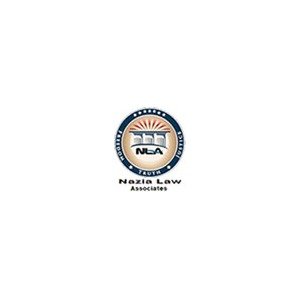Best Tax Lawyers in Pakistan
Share your needs with us, get contacted by law firms.
Free. Takes 2 min.
Or refine your search by selecting a city:
List of the best lawyers in Pakistan
Pakistan Tax Legal Questions answered by Lawyers
Browse our 2 legal questions about Tax in Pakistan and read the lawyer answers, or ask your own questions for free.
- Taxable Amount For Income Tax Deduction
- I am a government employee & living in a government accommodation. My Department gives House Requisition amount with salary to the employees who don't avail the facility of accommodation... Kindly clarify whether the amount equal to House Requisition can be accumulated as a taxable amount against the officials living in... Read more →
-
Lawyer answer by Recososa Law Firm
Good day from Recososa Law Firm!We received your inquiry through Lawzana regarding the taxability of the House Requisition amount given to government employees. We appreciate the opportunity to assist you on this matter and would like to provide a substantial...
Read full answer - Is their any government office that give a type of certificate of unemployment non-income tax
- My brother went to Canada in 2023 so in the immigration paper we showed him unemployment till 2023, my brother Didn't pay income tax in Pakistan nor get registration So how can I get the certificate of non-income tax
-
Lawyer answer by RI & Associates
To obtain a Certificate of Non-Income Tax for your brother, who has been unemployed and did not pay income tax in Pakistan, you can follow these steps:Filing a Declaration: Your brother can file a declaration with the Federal Board of...
Read full answer
About Tax Law in Pakistan
Tax law in Pakistan is governed primarily by the Federal Board of Revenue (FBR), a governmental organization responsible for enforcement and regulation of taxation on a national level. The country’s tax regime includes various types of taxes such as income tax, sales tax, customs duty, and excise duty. Pakistan operates on a fiscal year basis from July 1 to June 30. The main legislative frameworks include the Income Tax Ordinance 2001, the Sales Tax Act 1990, and the Federal Excise Act 2005. Understanding and complying with these laws is crucial for individuals and businesses to avoid legal issues.
Why You May Need a Lawyer
Tax law can be complex and challenging, and there are several situations where you may need legal assistance, including:
- Filing Income Tax Returns: Ensuring correct filing and understanding tax deductions and credits.
- Tax Compliance: If you are unsure whether your business or personal finances comply with tax laws.
- Dispute Resolution: Addressing disputes with the FBR or dealing with audits and assessments.
- Tax Planning: Structuring your investments and income in a tax-efficient manner.
- Inheritance and Gift Taxation: Navigating the tax implications of inherited or gifted assets.
Local Laws Overview
The key aspects of tax laws in Pakistan pertinent to individuals and businesses include:
- Income Tax Ordinance 2001: Governs the determination and imposition of taxes on income for individuals and businesses.
- Sales Tax Act 1990: Imposes tax on the sale and purchase of goods and services within the country.
- Customs Act 1969: Pertains to the regulation, assessment, and collection of customs duties.
- Federal Excise Act 2005: Covers the imposition of excise duties on a range of goods and services.
Frequently Asked Questions
What is the fiscal year in Pakistan?
The fiscal year in Pakistan runs from July 1 to June 30 of the following year.
Who is required to file an income tax return?
Any individual earning above a specified threshold, businesses, and certain other entities are required to file income tax returns.
What is the rate of sales tax in Pakistan?
The standard rate of sales tax is generally 17%, although this may vary for certain goods and services.
What is a tax refund?
A tax refund is the return of excess amount paid in taxes, typically due to over-calculations or allowable deductions & credits.
How can I challenge a tax notice or assessment?
You may file an appeal with the Commissioner Appeals or approach the Appellate Tribunal Inland Revenue.
Are there penalties for late filing of tax returns?
Yes, penalties and interest may apply for late filing or payment of taxes.
Do expatriates need to pay taxes in Pakistan?
Expatriates who are resident in Pakistan for tax purposes must pay taxes on income earned within the country.
Can tax liabilities be settled in installments?
In certain cases, arrangements can be made with the FBR to settle taxes in installments.
What is withholding tax?
Withholding tax is a government requirement where the tax is withheld at source by the payer and forwarded to the tax authorities.
How can I verify the authenticity of a tax consultant?
Ensure that the consultant is registered with the relevant professional bodies such as the Institute of Chartered Accountants of Pakistan (ICAP) or the Institute of Cost and Management Accountants of Pakistan (ICMAP).
Additional Resources
For more information and assistance, consider the following resources:
- Federal Board of Revenue (FBR): The official portal of the FBR for guidelines and online services.
- Institute of Chartered Accountants of Pakistan (ICAP): Offers resources and guidance on tax laws and practices.
- Chambers of Commerce: Local chambers provide insights and services on business and tax matters.
- Local Tax Offices: For local assistance and to address specific queries related to tax filings.
Next Steps
Should you need legal assistance with tax matters in Pakistan, consider the following steps:
- Identify Your Needs: Determine the type of tax issue you are facing or services you require.
- Research Qualified Lawyers: Look for lawyers specializing in tax law with a good track record and credentials.
- Consultation: Contact the lawyer for an initial consultation to discuss your issue and understand their approach.
- Verify Costs: Discuss the fee structure and ensure it aligns with your budget and expectations.
- Proceed with Legal Representation: Engage a lawyer to handle your tax matters, ensuring proper documentation and adherence to relevant laws.
Lawzana helps you find the best lawyers and law firms in Pakistan through a curated and pre-screened list of qualified legal professionals. Our platform offers rankings and detailed profiles of attorneys and law firms, allowing you to compare based on practice areas, including Tax, experience, and client feedback.
Each profile includes a description of the firm's areas of practice, client reviews, team members and partners, year of establishment, spoken languages, office locations, contact information, social media presence, and any published articles or resources. Most firms on our platform speak English and are experienced in both local and international legal matters.
Get a quote from top-rated law firms in Pakistan — quickly, securely, and without unnecessary hassle.
Disclaimer:
The information provided on this page is for general informational purposes only and does not constitute legal advice. While we strive to ensure the accuracy and relevance of the content, legal information may change over time, and interpretations of the law can vary. You should always consult with a qualified legal professional for advice specific to your situation.
We disclaim all liability for actions taken or not taken based on the content of this page. If you believe any information is incorrect or outdated, please contact us, and we will review and update it where appropriate.
Browse tax law firms by city in Pakistan
Refine your search by selecting a city.

















